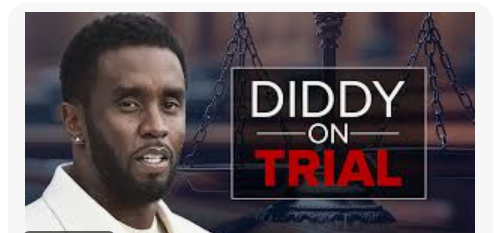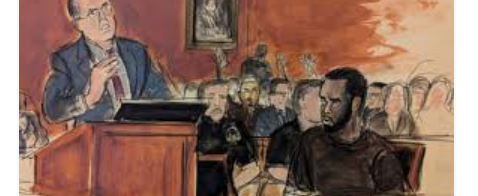Call us now:
What you need to know, and how does this compare to the Florida Criminal Justice System

Most people are already familiar with the identity of Mr. Combs (“Diddy”) and are aware that he is facing extensive criminal charges. What many Floridian’s don’t know is how their own state handles similar criminal accusations and how Florida crimes of a similar nature are prosecuted.
The federal criminal trial against hip-hop tycoon Sean Combs are scheduled to this week in a Manhattan courtroom. Combs — who is better known by nicknames like Puff Daddy, P. Diddy and Diddy — is facing charges of racketeering and sex trafficking for alleged crimes that took place over the course of two decades. Even though these types of charges are unusual, racketeering charges are becoming increasingly common in State Court, and are commonly referred to as RICO charges, and most often involve illegal drug organizations.
Federal prosecutors in the Southern District of New York have charged Combs with racketeering, sex trafficking and transportation to engage in prostitution. By comparing some key legal procedures with Florida law you can gain a better understanding of federal as well as Florida criminal prosecutions.
THE DIDDY TRIAL JURY POOL – How Many?
The first thing to note regarding the Diddy trial is the number and type of jurors who have been selected. For this trial the Judge has empaneled 12 jurors, and 6 alternate jurors. This means that the entire case will be presented to 18 people sitting in the jury box. 12 are the primary jurors, and 6 will excused immediately before the time of deliberations since their sole purpose is to fill in for one of the 12 primary jurors due to illness, absence, or excusal.

This contrasts distinctly with Florida law. In Florida State courts, all felony charges except capital offenses are tried by 6 jurors. (Florida Statute 913.10). That means in Florida the prosecution has fewer members of the public to convince that guilt has been proven beyond a reasonable doubt, therefore making it easier for the prosecution to reach a consensus of jurors in Florida. The selection of alternate jurors is done as a type of insurance against random circumstances that can disrupt the smooth operation of a trial. For example, if during the trial a juror is accused of misconduct (looking up media reports, being improperly influenced,…), falls ill, or for whatever reason can no longer be a juror, the trial can continue. The selection of alternates is generally left to the discretion of the trial judge, and the selection of 6 alternates indicates how much time and effort are being dedicated to ensuring when the time comes to deliberate, even if there is misconduct, illness, or excuse, there will be sufficient available jurors to deliberate and reach a verdict.
DIDDY TRIAL JURORS SWORN IN – Meaning?
Media reports indicate that the Jurors were sworn in immediately after the jury selection process. This is significant in Federal Court as well as in Florida criminal law. The swearing of the jury indicates the moment that jeopardy attaches. The US as well as Florida Constitutions protect against being twice put in jeopardy for the same offense. The Fifth Amendment to the United States Constitution provides that “no person shall be subject for the same offense to be twice put in jeopardy of life or limb.” This language is known as the Double Jeopardy Clause, or the guarantee against Double Jeopardy. What is important here is that when the jury is sworn to hear the case (not when they are sworn to begin the process of being selected to be a juror) the right to be protected by the double jeopardy clause ‘attaches’, so in the event of acquittal or some types of mistrial, the prosecuting authority will not be able to prosecute the Defendant.
DIDDY TRIAL JURORS QUESTIONED – What Purpose?
Jury selection has at at its core a simple idea, to ensure a group of unbiased and impartial citizens are able to listen to a presentation put on by the government, and listen to the Defense, be fair to each side, and render an impartial verdict based on the law and the evidence, and not as a result of prejudice, influence, bias, or emotion. Sounds simple enough, but when you actually start getting down to brass tacks problems start popping up everywhere because human beings can be messy complicated emotional beings. As a result, laws and rules have been put in place in every jurisdiction with the aim of achieving the goals above, but they frequently differ on how to go about getting the result they want.

To achieve fairness, each side gets the opportunity to make challenges to potential jurors. The Challenges come in 2 types, peremptory challenges (essentially the ability to strike at will) and challenges for cause – which are granted only for specific legal reasons where a re party can demonstrate there is some reasonable doubt that the juror is not fit to serve for some legal reason. To use their strikes intelligently, lawyers need information about jurors, hence the questioning.
- The primary goal of voir dire is to identify and excuse potential jurors who may have biases or other reasons to be unable to fairly decide the case.
- Voir dire allows attorneys to gain insights into potential jurors’ backgrounds, experiences, and perspectives to better understand their potential receptiveness to the case and legal principles.
- Jurors can be challenged for cause if they demonstrate a bias or inability to serve impartially.
DIDDY TRIAL VOIR DIRE – Who Questions the Jurors?
Judge Arun Subramanian questioned the jury pool – Florida, Federal Court, and different States have different methods of conducting jury selection. Even within a State there are some jurisdictional difference in how judges conduct their jury selections. Based on media reports, the judge in this case conducted the questioning by herself, which couldn’t be more distinct from the method of jury selection in Florida State court. Other States (like Maryland, for example) allow the trial judge to conduct the entirety of the jury questioning (sometimes referred to as ‘voir dire’) usually after receiving suggested questions from the parties (State and Defense) who submit proposed jury questions to the Court ahead of time. Also frequently used are jury questionnaires, which are provided to the jurors ahead of time and the results are returned to the Court and the parties for review to assist with an intelligent use of peremptory challenges by each side (strikes given to each side – the number changes based on the seriousness of the offense).
Florida is explicit in statute and rule that the right to voir dire the jurors is to be preserved, and therefore the parties themselves conduct the voir dire in open court. Florida law guarantees parties the right to conduct a reasonable oral examination of each juror during voir dire, according to Florida Rule of Criminal Procedure 3.300.

DIDDY TRIAL JURY SELECTION TOPICS – What do they mean?
Reports indicate that a wide range of topics were discussed during the jury questioning phase of the selection. These topics reportedly ranged from the juror’s feelings toward law enforcement to what kind of music they listen to – the judge thoroughly asked nearly 100 jurors whether they had seen, posted or liked any online content related to the case and whether they could form opinions based solely on the evidence presented during trial – potential jurors who said they might be biased toward Combs or his alleged victims were dismissed.
Breaking down each topic mentioned is key to understanding the goals of the prosecution and defense when analyzing a case. Feelings towards law enforcement is a common area of inquiry since it can provide valuable information about overt prejudice a juror may feel in favor of the prosecution, but could also demonstrate a bias in favor of lending credibility to law enforcement witnesses. If a juror admits to said bias in favor of believing police witnesses this would be grounds to strike a juror for cause.
Media exposure questions are standard to ask in almost any case where there has been media coverage. This is because exposure to facts and allegations as they are being reported can hopelessly bias a witness for or against the parties, and most importantly can render the juror tainted by knowledge of facts and circumstances that may never ben introduced during the trial, or have been presented in the media in a manner which stopped the ability of the parties from challenging or presenting the evidence in a way which was legally appropriate. Being able to ignore information you have gathered outside of the trial is not expected of any juror, and is a commonly cited reason to strike a juror for cause in Florida as well as in Federal court.
The final group affirmed that they would remain impartial and would avoid reading, researching or discussing the case outside of the courtroom. This is a standard admonition involved in every trial, and its goal is to protect the rights of the parties to present evidence, challenge evidence, and maintain fair administration of the rules which ultimately is the core necessity of a legitimate verdict.
For more information about Florida Criminal Law click here.
For help with any Criminal Matter – CALL NOW
